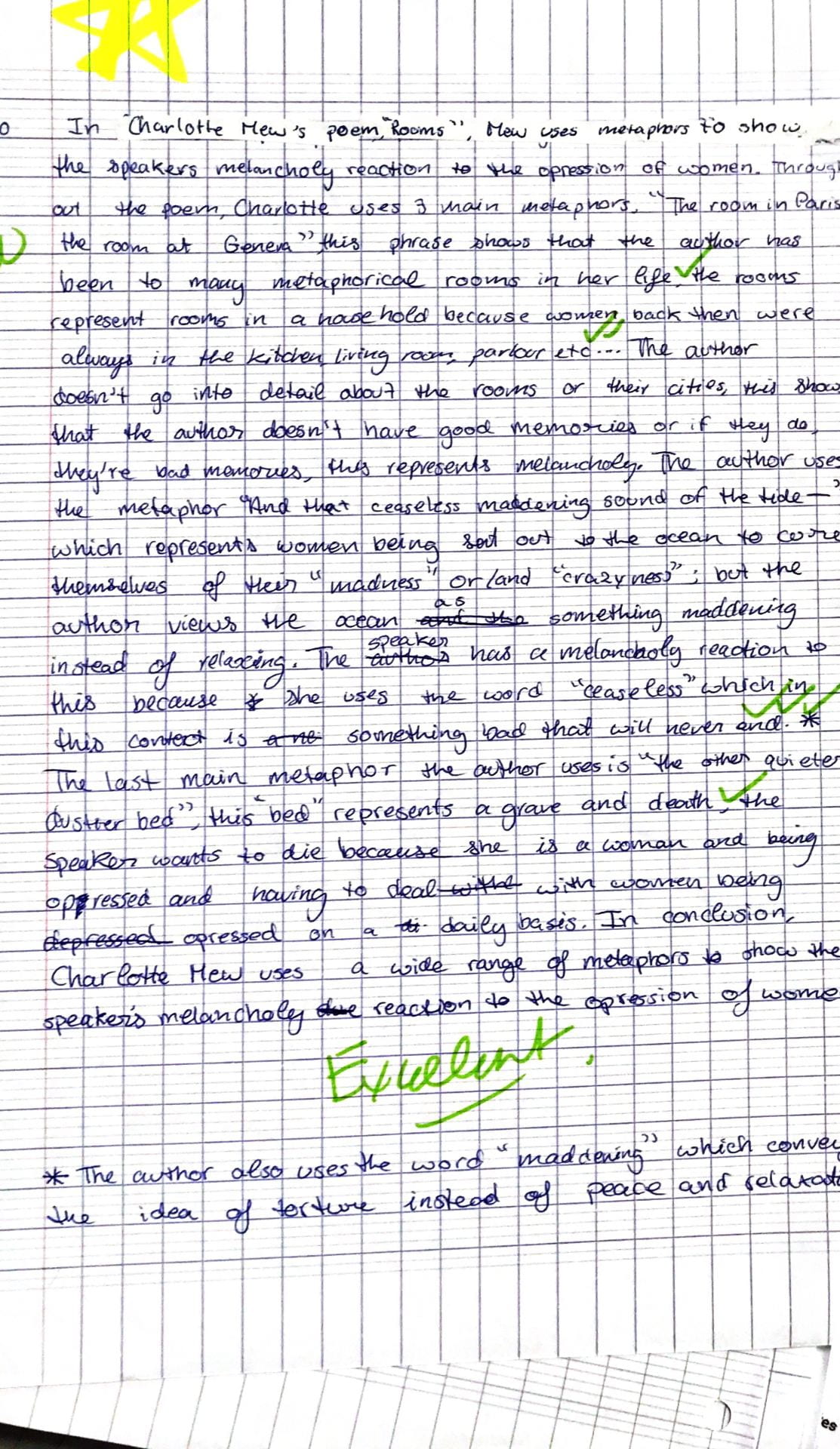Kahoot: https://create.kahoot.it/share/poems/07dbd774-b3f3-419f-a401-b200ff3f947c
Love in a Life by Robert Browning
Poet: Robert browning
Theme: love, death, sadness
Main devices:
Personification: “trouble behind her” “couch’s perfume”
Imagery: “couch’s perfume” “fresh in fortune”
Numbered stanzas: “I” “II”
Thesis statement: In robert browning’s poem “love in a life” browning portrays mystery and suspense by using personification, metaphor and imagery.
Waterfall by Lauris Edmond
Themes: life, time, carpe diem, nature of life
Main devices:
Metaphor: “time’s irreversible river” “the dark pool”
1st person: “i” “we”
Personification: “jeweled arc of the waterfall” “water holds our reflections”
Oxymoron: “astringent sweetness” “jauntiness sinewed”
Alliteration: “fast, fast falling” “you, young” “falls fast”
Thesis statement: In lauris edmond’s poem “waterfall”, edmond illustrates the path of life through metaphors, personifications and alliteration.
Verses Written on her Death-bed at Bath to her Husband in London by
Mary Monck (‘Marinda’)
Themes:
Power of love
Manipulation
Acceptance of death – “and die, as I have lived, thy faithful wife”
Main devices:
Personnification
Imagery – “He promises a lasting rest from pain” & “The eternal sciences of Heaven he sets in view”
Thesis statement: in the poem ”Verses written on her Death-bed at Bath to her Husband in London” Mary Monck uses Personification and Imagery to represent the character’s struggle with her transition into the after world and her last words to her loved ones.
Stanzas Written in Dejection, near Naples by Percy Bysshe Shelley
Themes:
Life
Death
Main devices:
Alliteration – “winds and waters”
Metaphor – monotony
Punctuation – ;
Thesis statement:
Percy Bysshe Shelley’s poem Stanzas Written in Dejection, near Naples uses an extended metaphor along with alliteration and punctuation to express the poet’s journey and challenges he faces with his life’s decisions.
Nearing Forty by Derek Walcott
Themes:
Life mirrors
How you view it ( life )
Existential crisis
Main devices:
Metaphor / extended metaphor – “vision thickening
To a frosted pane”
Diction of common household objects – “kettle”
Diction of broken objects – “dented kettle”
Punctuation – “-“
Repitition – “bleaching bedsheet”
Personification – “life bled”
Thesis statement:
Derek Walcott’s poem uses metaphors, personnification and diction of broken objects to represent the transition from youth to adulthood.
A Leave-Taking by Algernon Charles Swinburne
Themes: unrequited love
Main devices:
Repetition – “let us”,
Diction of sea – “seaward,great winds, foam, sand”
Metaphors – “All is reaped now;no grass is left to mow”
Personification – “we gave love”,
Thesis statement: In this poem Charles uses many repetition of words and plenty of anaphores, personification and metaphors to expose his sorrow feelings after being rejected by his true love.
I Hear an Army by James Joyce
Themes:
Lost love
Nightmare
What it feels like to lose someone that you love
Betrayed by war/abandoned
Main devices:
Assonance – “reins”
Onomatopoeia- “clanging, clanging”
Simile – “as”
Alliteration – “shouting by the shore”
Consonance – “army charging”
Imagery
Thesis statement:
In James Joyce’s poem, “I hear an army”, he uses aggressive diction, imagery and repetition to express the speaker’s true emotions of lamentation after a heartbreak.
After by Philip Bourke Marston
Themes: Ephemeral nature of life and love, melancholy
Main Devices:
Shifts
Repetition – “A little time for laughter, A little time to sing”
4 Shifts between paragraphs
Thesis statement: In this poem, Martson uses shifts, repetition, and sensory imagery to convey his message that you only live once.
An Essay on Criticism by Alexander Pope
Themes: obstacles created by knowledge
Main device:
alliteration, paradox – “ a little learning is a dangerous thing ”, paradox-metaphor “ drinking largely sobers is again “
Thesis Statement:
In Alexander Pope’s poem “From an Essay on Criticism “ Alexander Pope tells us how the poetry is a large thing and how a little learning can be dangerous.
Rooms by Charlotte Mew
Themes:
Confinement
Disappointment
Sadness
Feminism
Main devices:
Sibilance/alliteration – “steady slowing” “shall somewhere” “remember rooms”
Metaphor – “the room in paris, the room at geneva” “in the other quieter, dustier bed”
Repetition – “died […] dead” “room in paris, room at geneva”
Paradox – “Out there in the sun- in the rain”
Thesis statement: In Charlotte mew’s poem “Rooms” Charlotte Mew describes the life of a woman before by including examples of metaphor, paradox and imagery.
Rhyme of the Dead Self– A.R.D Theme:
Murder (who represent the new beginning)
Transition to adulthood
Main devices:
Diction of violence – “strangle” “choked” “catching”
Child word – “Holus bolus” “folly”, Symbol – “lily-white”
Paradox “chuckling I dragged out his foolish brains”
Allusion – “shall not rise on the third day or any other day”
Thesis statement:
The poem speak about the speaker who murder his young self to give up his child mentality and to transit to his adulthood
The Character of a Happy Life by Henry Wotton
Themes:
Happiness
Joys of living
Religion
Self reflection as the secret to happiness
Importance of being independent from society
Main devices:
Diction of servitude – “serveth, freed”
Diction of religion – “God, religious book”
Thesis statement:
In Henry Wotton’s poem ”The Character of a Happy Life” Henry Wotton uses diction of servitude and diction of religion to depict the fundamental values of a good life and what men should avoid at all costs.
The Forsaken wife by Elizabeth Thomas
Themes:
Love
Anger
Feminism
Contrast men v women
Main devices:
Anaphores – one pitying look, one parting word.”
Diction of hate – “Cruel” “infidelity”
Thesis Statement:
In Elizbath thomas’ poem “The forsaken wife” she uses pronouns diction of anger, and parallel structure to show the suffering of infidelity.










